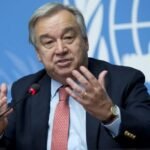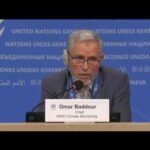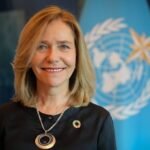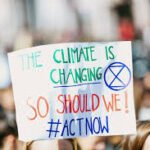The U.N. weather agency has issued a “red alert” regarding global warming, citing unprecedented increases last year in greenhouse gases, land and water temperatures, and the melting of glaciers and sea ice. They caution that efforts to reverse this trend have been insufficient.
Record-Hot Projection for 2024 by U. N.
 The World Meteorological Organization has expressed a “high probability” that 2024 will mark another record-hot year. This intensifies concerns that the goal of limiting planetary warming to 1.5 degrees Celsius from pre-industrial levels, as outlined in the Paris agreement, is increasingly at risk.
The World Meteorological Organization has expressed a “high probability” that 2024 will mark another record-hot year. This intensifies concerns that the goal of limiting planetary warming to 1.5 degrees Celsius from pre-industrial levels, as outlined in the Paris agreement, is increasingly at risk.
Evident Climate Trends for Red alert

According to the agency’s “State of the Global Climate” report released Tuesday, the period from March 2023 to February 2024 surpassed the 1.5-degree limit, averaging 1.56 degrees Celsius higher. U.N. Secretary-General Antonio Guterres emphasized the urgent need for action, stating that fossil fuel pollution is pushing climate chaos to unprecedented levels.

Omar Baddour, the WMO’s chief of climate monitoring, noted that the year following an El Niño event tends to be warmer, indicating a high likelihood of 2024 breaking the previous year’s record. The report highlights alarming trends such as widespread ocean heatwaves, record ice loss from glaciers, and the lowest Antarctic sea ice levels on record.
Jonathan Overpeck of the University of Michigan School for Environment and Sustainability emphasized the gravity of the situation, describing the planet as being in a literal and figurative meltdown due to polar ice loss and warming.
Humanity’s Defining Challenge

Celeste Saulo, the WMO’s secretary-general, stressed that the climate crisis is the foremost challenge facing humanity, compounded by issues of inequality manifested in food insecurity and migration patterns.

Call for Increased Commitments by U. N.
Despite the dire outlook, the report identifies a glimmer of hope in the significant increase in renewable energy capacity. However, experts emphasize the urgent need to curb greenhouse gas emissions and seize economic opportunities presented by renewable energy sources.
 As climate experts and government officials convene in Copenhagen to discuss climate action, there’s a call for increased national commitments to combat global warming. However, University of Victoria climate scientist Andrew Weaver laments the recurring cycle of inaction by decision-makers despite repeated wake-up calls from reports like these.
As climate experts and government officials convene in Copenhagen to discuss climate action, there’s a call for increased national commitments to combat global warming. However, University of Victoria climate scientist Andrew Weaver laments the recurring cycle of inaction by decision-makers despite repeated wake-up calls from reports like these.










